ORWELL
BOOKS BY JEFFREY MEYERS
Biography
A Fever at the Core: The Idealist in Politics
Married to Genius
Katherine Mansfield
The Enemy: A Biography of Wyndham Lewis
Hemingway
Manic Power: Robert Lowell and His Circle
D. H. Lawrence
Joseph Conrad
Edgar Allan Poe: His Life and Legacy
Scott Fitzgerald
Edmund Wilson
Robert Frost
Bogart: A Life in Hollywood
Gary Cooper: American Hero
Privileged Moments: Encounters with Writers
Wintry Conscience: A Biography of George Orwell
Inherited Risk: Errol and Sean Flynn in Hollywood and Vietnam
Somerset Maugham
Impressionist Quartet: The Intimate Genius of Manet and Morisot, Degas and Cassatt
Modigliani
Samuel Johnson: The Struggle
The Genius and the Goddess: Arthur Miller and Marilyn Monroe
Criticism
Fiction and the Colonial Experience
The Wounded Spirit: T. E. Lawrence's Seven Pillars of Wisdom
A Reader's Guide to George Orwell
Painting and the Novel
Homosexuality and Literature
D. H. Lawrence and the Experience of Italy
Disease and the Novel
The Spirit of Biography
Hemingway: Life into Art
Bibliography
T. E. Lawrence: A Bibliography
Catalogue of the Library of the Late Siegfried Sassoon
George Orwell: An Annotated Bibliography of Criticism
Edited Collections
George Orwell: The Critical Heritage
Hemingway: The Critical Heritage
Robert Lowell: Interviews and Memoirs
The Sir Arthur Conan Doyle Reader
The W. Somerset Maugham Reader
Edited Original Essays
Wyndham Lewis: A Revaluation
Wyndham Lewis by Roy Campbell
D. H. Lawrence and Tradition
The Legacy of D. H. Lawrence
The Craft of Literary Biography
The Biographer's Art
T. E. Lawrence: Soldier, Writer, Legend
Graham Greene: A Revaluation
ORWELL
Life and Art
JEFFREY MEYERS
UNIVERSITY OF ILLINOIS PRESS
Urbana, Chicago, and Springfield
2010 by the Board of Trustees
of the University of Illinois
All rights reserved
Manufactured in the United States of America
1 2 3 4 5 C P 5 4 3 2 1
 This book is printed on acid-free paper.
This book is printed on acid-free paper.
Library of Congress Cataloging-in-Publication Data
Meyers, Jeffrey.
Orwell : life and art / Jeffrey Meyers.
p. cm.
Includes bibliographical references and index.
ISBN-13: 978-0-252-03561-6 (hardcover : alk. paper)
ISBN-10: 0-252-03561-5 (hardcover : alk. paper)
ISBN13: 978-0-252-07746-3 (pbk. : alk. paper)
ISBN10: 0-252-07746-6 (pbk. : alk. paper)
1. Orwell, George, 19031950Criticism and interpretation.
2. Authors, English20th centuryBiography.
3. JournalistsGreat BritainBiography.
I. Title.
PR6029.R8Z73555 2010
828'.91209dc22 2010030298
For
Joseph Frank
CONTENTS
INTRODUCTION
George Orwell, the most widely read and influential serious writer of the twentieth century, has been my lifelong interest. My dissertation and first book, Fiction and the Colonial Experience (1973), considered cultural conflicts in the novels of Kipling, Conrad, Forster, Joyce Cary and Graham Greene that developed when European nations imposed their manners and customs, religious beliefs and moral values on an indigenous way of life. My extensive travels in India and Africa, and professional interest in this subject, led me to Burmese Days and to a passion for Orwell. I eventually wrote four books about him: A Reader's Guide to George Orwell (1975), George Orwell: The Critical Heritage (1975), George Orwell: An Annotated Bibliography of Criticism (with Valerie Meyers, 1977) andwhen dissatisfied with all the previous biographiesa full-scale life: Orwell: Wintry Conscience of a Generation (2000).
The twenty-one essays in this volume were published over a period of forty years, between 1968 and 2009. I return to some striking passages several times, but interpret them differently in various contexts. This book begins with an account of Orwell's autobiographical writings from the beginning of his career through the Spanish Civil War; continues with analyses of his major works, and general essays on his style, ideas about writing and quirky humor; and concludes by focusing on the six biographies of Orwellincluding my own.
Orwell's literary qualitiesvigorous style, engaging honesty, sly witimmediately attract us. And his personal qualitiesintegrity, idealism and commitmentshine through his writing like pebbles in a clear stream. In his own lifetime Orwell's passionate desire to unite the disparate classes and create a just society in England commanded respect and gave him a special aura. Though he was intensely conscientious, he was hard on himself. His obstinate search for moral values animates his essays and novels, and his lucid prose represents a triumph over the chaos and self-doubt that lies beneath the surface. His legend was partly self-created, and his work has hadstill hasextraordinary political and cultural influence. Orwell's books have not dated (though he was born more than a century ago), and we can now see the complexity of his struggle and the greatness of his achievement.
Very few writers lives can stand up to the intense scrutiny of modern biographers, but the more I studied Orwell, the more appealing he became. I found few flaws, and even those made him seem rather eccentric, even charming. There is an admirable consistency between the values he advocates in his work and those that guided his behavior, often under difficult and dangerous conditions, in his life. He was a seeker after justice and truth, with an instinctive insight into the heart of social and political problems. His vision is sharp, concrete and absolutely realistic. His political beliefs were determined by harsh experience rather than by ideological considerations. His most impressive personal and literary characteristics were a Conradian concern with human solidarity; generosity of spirit that extends to enemy prisoners, French collaborators and Fascist war criminals; intellectual honesty in admitting his own mistakes; balanced judgment; courage to speak out against any mean or cowardly attitude; and defense of provocative and unpopular views.
The recent Polish film Katyn is a striking example of the suppression of truth for political reasons by those in power. Both the Russian murderers and (for once) the innocent Germans accused each other of massacring thousands of captured Polish officers and members of the intelligentsia in the forest of Katyn, near Smolensk, in April 1940. The Russians did not admit the truth about this mass murder until 1989. Though he died sixty years ago, we need Orwell now more than ever.
Two passages from Anna Funder's brilliant memoir, Stasiland: Stories from Behind the Berlin Wall (2003), suggest the lasting political influence of Orwell's final books. After noting that Orwell's works were banned in East Germany, Funder suggests that a widely viewed television program cunningly reflected the oppressive Communist state: Big Brother was a wildly popular reality tv program screened here recently, where people were locked in a house together and filmed day and night by security cameras. Named for the head of the surveillance regime in Orwell's novel Nineteen Eighty-Four


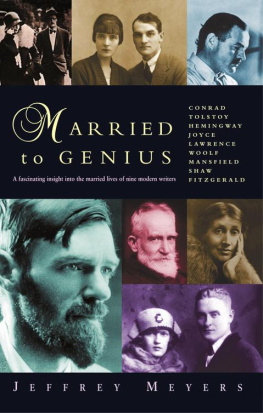
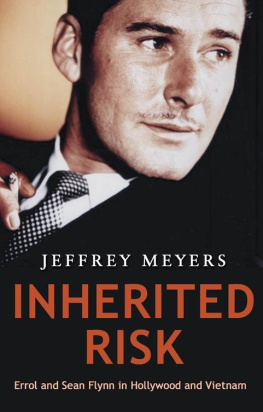
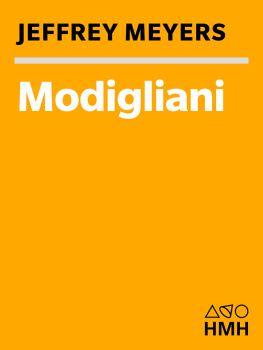

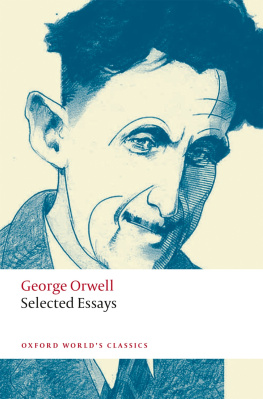
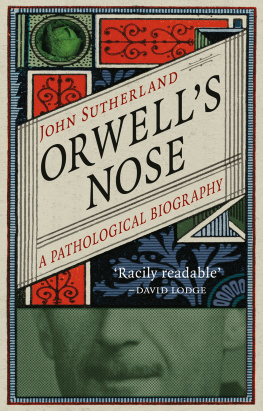
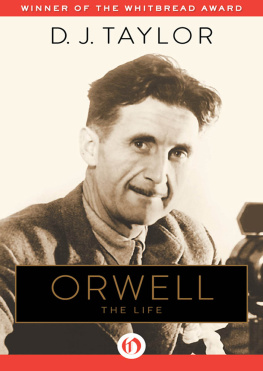

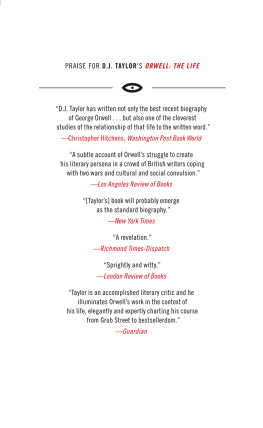
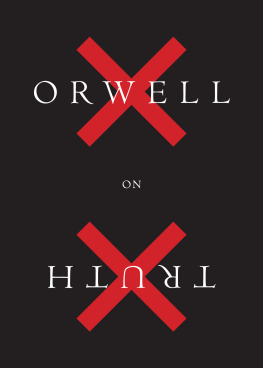
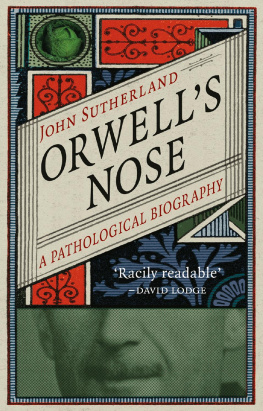
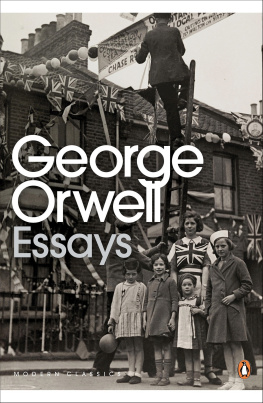
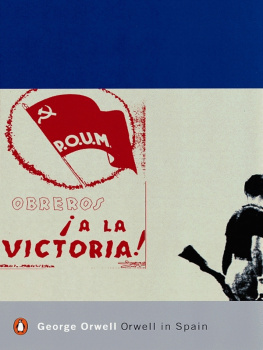
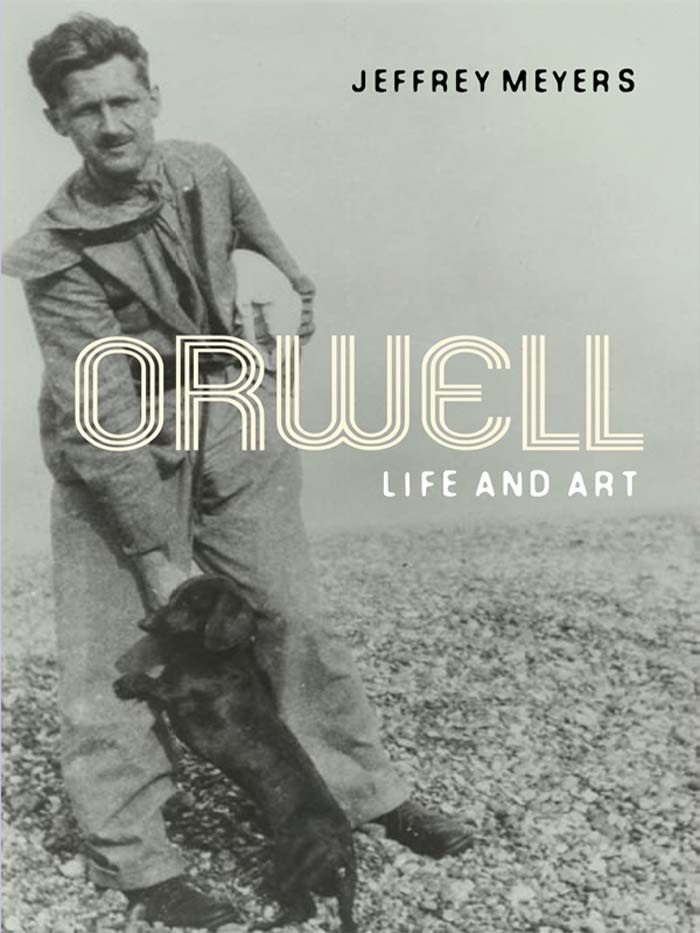
 This book is printed on acid-free paper.
This book is printed on acid-free paper.